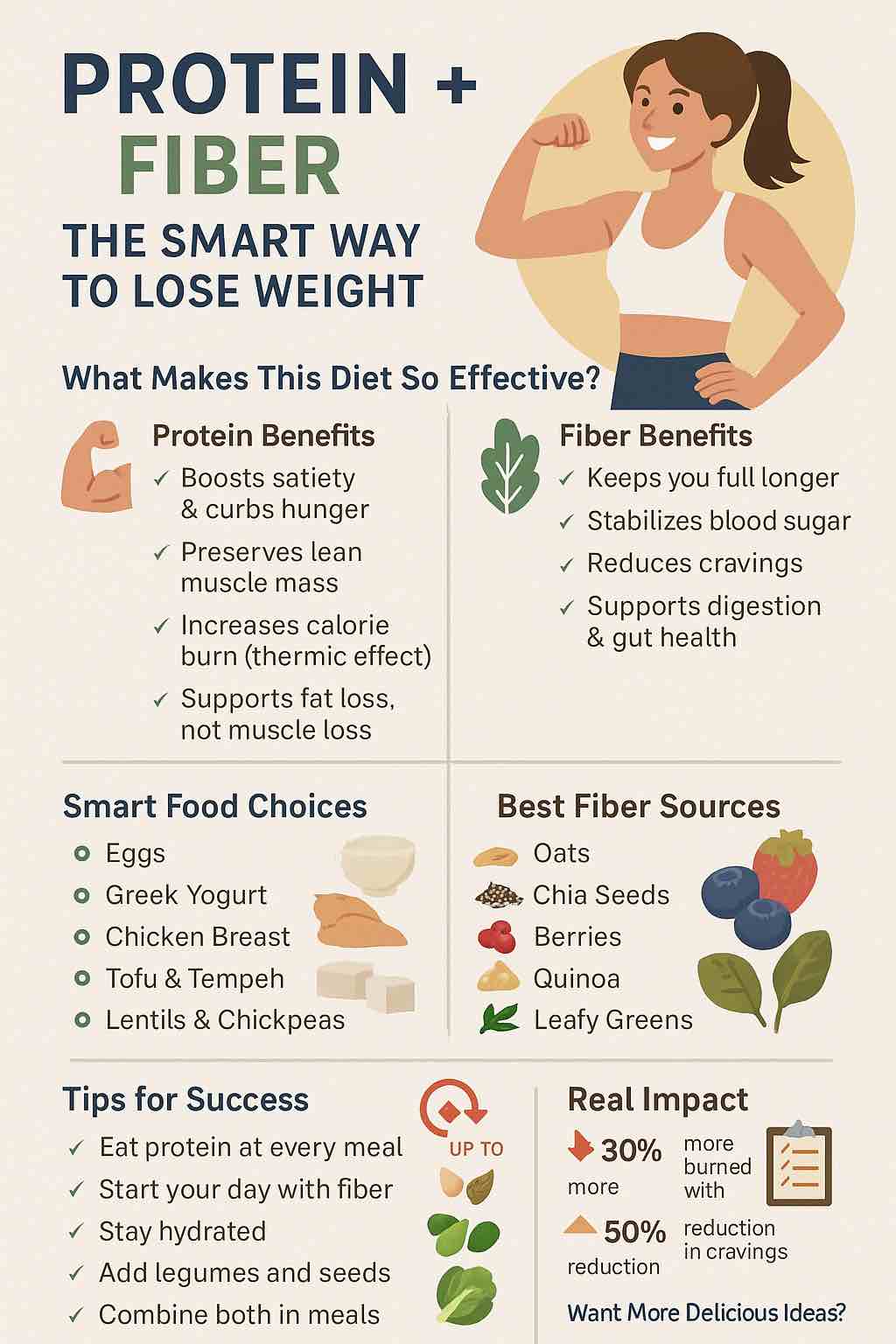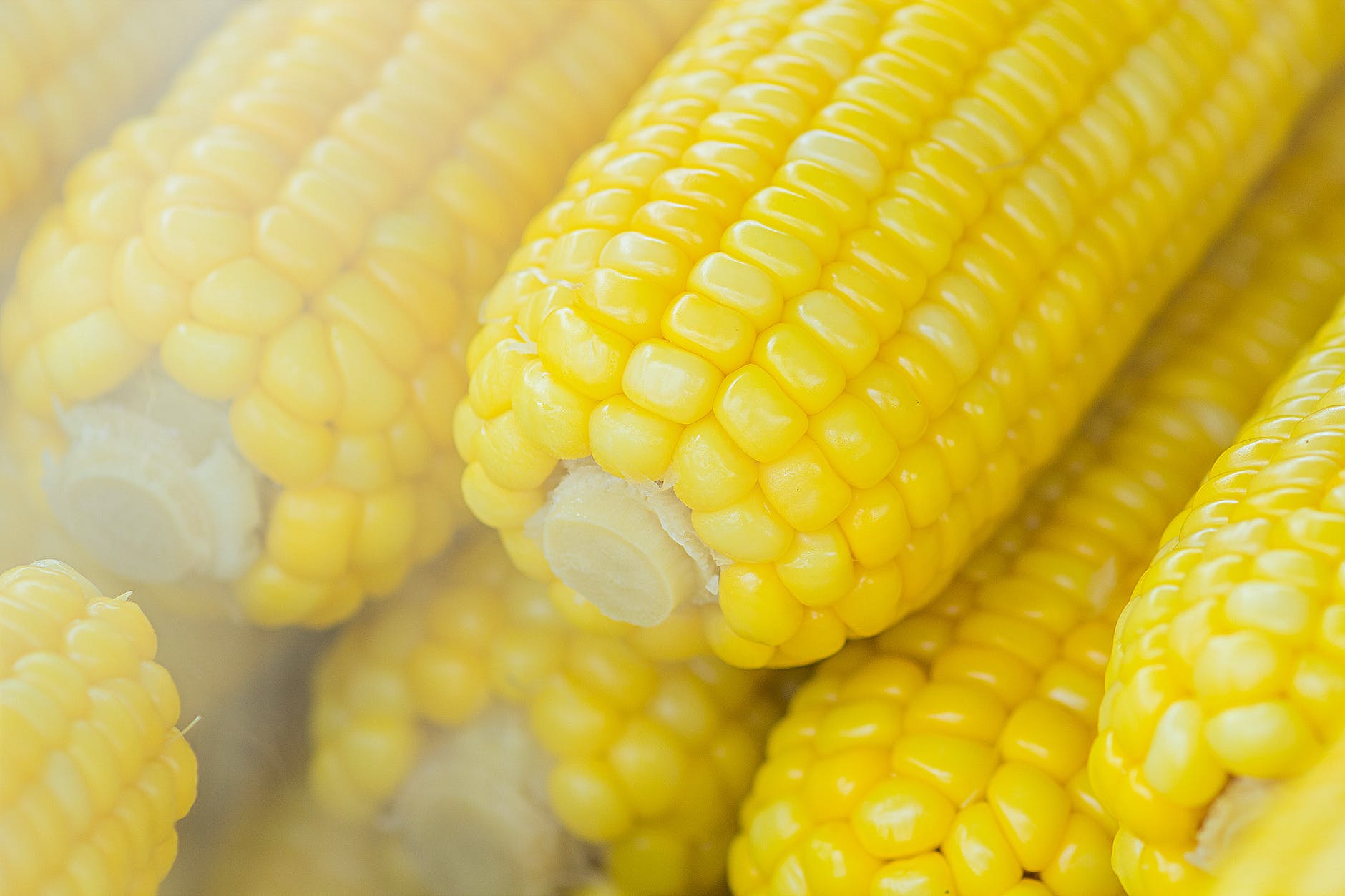
When it comes to sustainable weight loss, fad diets often promise quick results but leave us frustrated and rebounding. What actually works? Science points us to something beautifully simple: a high-protein, high-fiber diet.
This power duo not only helps shed pounds but also keeps you full, energized, and metabolically balanced. In this post, we dive deep into how these two nutrients work together to support healthy weight loss—backed by the latest research and practical tips to help you get started.
🧬 The Science of Satiety: Why Protein and Fiber Matter
At the heart of any weight loss strategy is one key factor: calories in vs. calories out. But what if you could naturally reduce your calorie intake without feeling starved? That’s where protein and fiber step in.
🥩 Protein: The Hunger-Suppressing Macronutrient
Protein plays multiple roles in weight management:
- Reduces Appetite: It increases the release of satiety hormones (GLP-1, PYY) and decreases the hunger hormone ghrelin. As a result, you’re likely to eat fewer calories throughout the day.
- Preserves Muscle Mass: During weight loss, we often lose both fat and muscle. Protein ensures your body burns fat rather than precious lean tissue.
- Boosts Metabolism: Protein digestion has a high thermic effect, meaning it burns more calories during digestion than carbs or fats.
🔍 Clinical Insight: According to a study published by the University of Illinois, higher protein intake was significantly associated with better weight loss outcomes, especially when combined with calorie control.
🌾 Fiber: The Filling, Gut-Friendly Hero
Fiber, especially the soluble type, forms a gel-like substance in the gut. This slows digestion and keeps you fuller longer.
- Increases Fullness: More fiber = fewer hunger pangs. You feel satisfied for hours without excess calories.
- Regulates Blood Sugar: A stable blood sugar curve means fewer cravings and energy crashes.
- Feeds Good Gut Bacteria: A balanced gut microbiome can influence weight management by improving digestion and reducing inflammation.
📚 Fun Fact: A Harvard study found that increasing dietary fiber was one of the simplest and most effective strategies for losing weight without drastically changing eating habits.
🥦 Why the Combo Works: Fiber + Protein = Weight Loss Synergy
You’ve heard of power couples—this is the dietary version.
When consumed together, protein and fiber:
- Enhance meal satisfaction.
- Stabilize blood sugar better than either alone.
- Promote a calorie deficit naturally by reducing the desire to snack.
- Encourage long-term adherence to healthy eating habits because you’re not battling constant hunger.
🧘♀️ Beyond Weight Loss: Additional Benefits
Adopting a high-protein, high-fiber diet doesn’t just help the scale move—it improves overall health:
| Benefit | How It Helps |
|---|---|
| 🔄 Balanced Hormones | Protein and fiber regulate insulin and appetite hormones. |
| ❤️ Heart Health | Fiber helps lower LDL cholesterol levels. |
| 💪 Muscle Retention | Protein protects muscle mass, especially during dieting. |
| 🌿 Gut Health | Fiber nourishes good gut bacteria, improving digestion. |
| ⚡ Energy and Focus | Stable blood sugar = sustained energy and fewer crashes. |
🍽️ Sample High-Protein, High-Fiber Foods
To get started, aim for meals that balance both nutrients. Here are some star performers:
🥜 Protein-Rich Choices:
- Lentils, chickpeas, tofu
- Eggs, Greek yogurt
- Chicken, turkey, fish
- Nuts, seeds (chia, flax, pumpkin)
🌽 Fiber-Packed Options:
- Oats, quinoa, brown rice
- Berries, apples (with skin), bananas
- Broccoli, spinach, sweet potatoes
- Beans, legumes, avocados
🗓️ A Day on a High-Protein, High-Fiber Diet
Breakfast: Greek yogurt with chia seeds, oats, and berries
Lunch: Grilled chicken salad with avocado, black beans, and quinoa
Snack: Handful of almonds and a pear
Dinner: Stir-fried tofu with broccoli, bell peppers, and brown rice
Hydration: At least 2 liters of water daily (fiber needs fluids!)
⚖️ Weight Loss Tips: Make It Work for You
- Start Slow: Increase fiber gradually to avoid bloating and cramps.
- Stay Hydrated: Water is essential when consuming high fiber.
- Plan Meals: Prepping high-protein, high-fiber meals reduces impulse eating.
- Mix and Match: Combine animal and plant proteins for variety and complete amino acid profiles.
- Track Progress: Use a food journal or app to ensure you’re hitting your targets.
❌ Common Pitfalls to Avoid
- Too Much Too Soon: A sudden fiber increase can backfire.
- Ignoring Portion Sizes: Even healthy food has calories.
- Low Water Intake: Can lead to constipation with a high-fiber diet.
- Protein Overload Without Fiber: May cause sluggish digestion or poor satiety.
💬 Final Thoughts
A high-protein, high-fiber diet is more than a trend—it’s a lifestyle upgrade backed by science. By promoting satiety, stabilizing blood sugar, preserving muscle mass, and improving gut health, this diet helps you lose weight sustainably and feel fantastic while doing it.
You don’t need gimmicks or deprivation—just smart, nutrient-rich choices.
🧠 Want to Learn More?
We’ve only scratched the surface. Dive deeper into expert tips, meal plans, and delicious recipes tailored for weight loss success—only on MasalaMonk.com.
👉 Click here to explore more high-protein, high-fiber diet ideas
❓ 10 FAQs About High-Protein, High-Fiber Diets for Weight Loss
1. How much protein should I eat daily for weight loss?
Most experts recommend 1.2–2.0 grams of protein per kilogram of body weight. For someone weighing 70 kg (154 lbs), that’s about 84–140 grams daily, depending on activity level and goals.
2. How much fiber do I need each day?
Women should aim for at least 25 grams of fiber per day, while men should target 30–38 grams. Most people currently eat far less than this.
3. Can I lose weight just by increasing protein and fiber without counting calories?
Yes—many people naturally eat fewer calories when they feel fuller for longer. That said, tracking intake (even roughly) can enhance results.
4. Are plant-based sources of protein and fiber effective for weight loss?
Absolutely. Beans, lentils, tofu, seeds, and whole grains are excellent plant-based options that support weight loss just as effectively.
5. Will a high-protein, high-fiber diet affect digestion?
In the short term, increasing fiber too quickly can cause gas or bloating. Start slow and drink plenty of water. Long-term, fiber improves digestion and gut health.
6. Can I follow this diet if I’m vegetarian or vegan?
Yes. Lentils, chickpeas, quinoa, chia seeds, tofu, tempeh, and whole grains are great sources of both protein and fiber for plant-based eaters.
7. What’s the best time to eat protein and fiber for weight loss?
Distribute intake evenly throughout the day to maintain satiety, stable energy, and blood sugar. Don’t skip protein or fiber at breakfast!
8. How soon can I see weight loss results?
Results vary, but many people notice reduced cravings, better portion control, and initial fat loss within the first 2–4 weeks of consistent eating.
9. Can this diet help with belly fat?
Yes. Protein helps preserve muscle while burning fat, and fiber helps reduce insulin spikes—both key in targeting visceral (belly) fat.
10. Is this a sustainable, long-term approach?
Definitely. Unlike restrictive diets, a protein- and fiber-rich approach is sustainable, promotes real food, and supports overall wellness.












